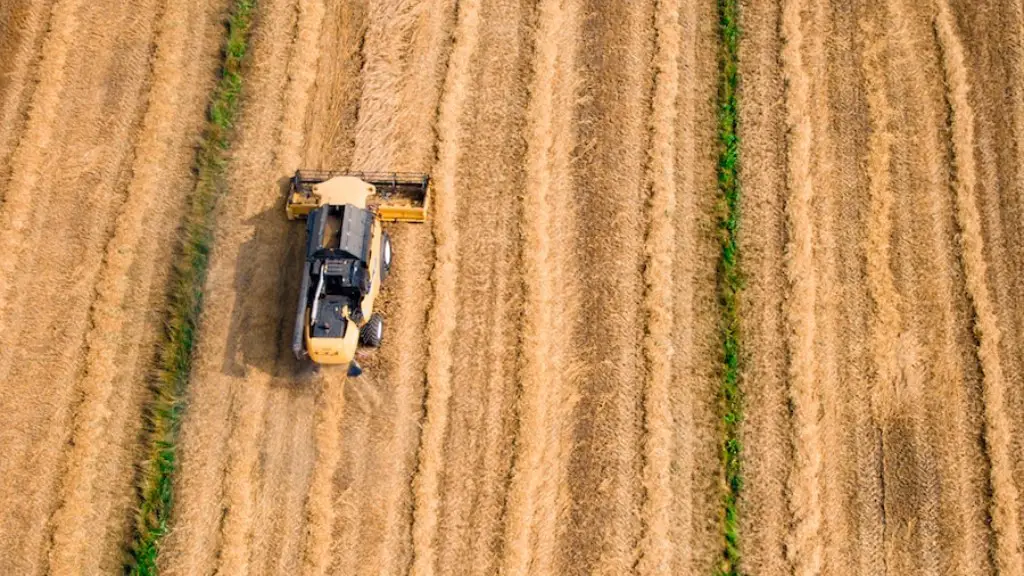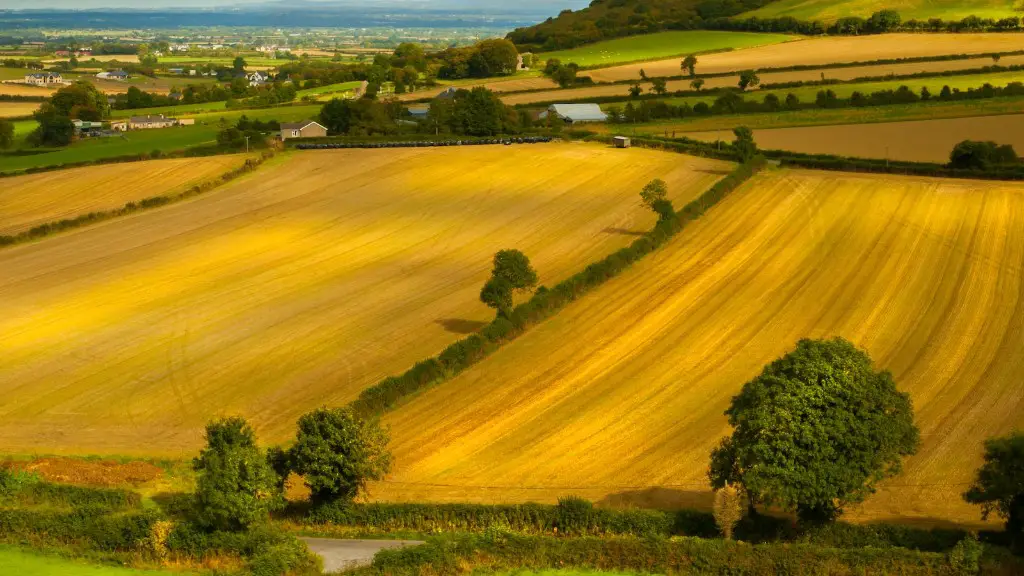The importance of agriculture in Nigeria cannot be overstated. It is the bedrock of the country’s economy, contributing immensely to GDP, employment, and exports. Nigeria is Africa’s largest producer of palm oil, yams, cocoa, and groundnuts, and is also a major producer of cotton, millet, sorghum, and Cassava. The sector provides livelihoods for over half of the country’s population and is responsible for over 80% of rural employment. Agriculture is also a key driver of Nigeria’s export economy, with oilseeds, livestock, and fish being the main export commodities. Given the importance of agriculture in Nigeria, it is critical that the country invest in the sector to ensure its continued growth and development.
Agriculture is the backbone of Nigeria’s economy and the mainstay of its people. Agriculture accounts for about 24% of Nigeria’s Gross Domestic Product (GDP), employs about 60% of the country’s workforce, and is the dominant occupation in rural Nigeria. The sector is a key source of foreign exchange and government revenue. Nigeria is the world’s seventh largest producer of cocoa, the eleventh largest producer of cotton, and the eighteenth largest producer of palm oil. The country is also a major producer of yams, sorghum, millet, groundnuts, beans, cassava, and cowpeas.
Nigeria’s agricultural potential is enormous. The country has a land area of 923,768 square kilometers, of which about 60% is arable. Nigeria’s climate is tropical and favors the production of a wide range of crops. There is ample rainfall, and rivers and streams provide water for irrigation. Nigeria’s soils are also generally fertile. However, the country’s agricultural productivity is low due to a number of factors, including the small size of most farms, the reliance on traditional farming methods, and the lack of access to modern inputs and
What are the importances of agriculture?
Agriculture is vital for a number of reasons. It is the main source of raw materials for industries, it is important to international trade, it plays a big role in a nation’s revenue, and it provides employment. It is also crucial to a country’s development and can help heal the environment. Additionally, agriculture goes hand-in-hand with war, as food is often used as a weapon.
Nigeria’s agricultural sector is a significant contributor to the country’s GDP. Between July and September 2021, the sector contributed almost 30 percent to the total GDP, an increase of about six percentage points compared to the previous quarter. The sector is a major source of employment and livelihood for the people of Nigeria.
What are five importance of agriculture
It is essential to remember that agriculture is the primary source of raw materials for many industries. Cotton and jute fabric, sugar, tobacco, and edible and non-edible oils are all sourced from agriculture. These raw materials are then used in drugs, diesel fuel, polymer, and other significant sectors. Without agriculture, these industries would not be able to function. Therefore, it is vital to support and invest in agriculture in order to ensure the continued success of these key businesses.
Nigeria is a country located in West Africa with a population of over 200 million people. It has a tropical climate and is rich in natural resources, including oil and gas. The country also has a large agricultural sector, with 708 million hectares of farmland. The main crops grown in Nigeria are maize, cassava, guinea corn, yam beans, millet and rice.
What is the most important agriculture?
There are a few key production stats to know about cow milk, wheat, and corn. Cow milk is the top agricultural product in 37 countries, while wheat is the top agricultural product in 14 countries. Corn is the most produced crop globally with 11 billion tons, followed by wheat with 7609 million tons and rice with 7567 million tons.
It is no secret that Nigeria’s agricultural sector is in dire need of reform. In order to ensure the sector’s continued viability, it is essential that the issues outlined in this article are addressed. In particular, the worsening insecurity and climate change are two pressing concerns that must be addressed in order to ensure the sector’s continued success. Additionally, agro finance and inputs must be improved in order to make the sector more competitive. Finally, poor research funding is a major issue that must be addressed in order to ensure that the sector can continue to innovate and improve.
What type of agriculture practice in Nigeria?
The agriculture industry in Nigeria is very diverse, with a large variety of crops and livestock being produced. The main crops grown are cocoa, peanuts, cotton, palm oil, corn, rice, sorghum, millet, cassava (manioc, tapioca), yams, rubber, and timber. livestock, such as cattle, sheep, goats, pigs, and fish are also important products of the agriculture industry in Nigeria.
The history of agriculture in Nigeria dates back to the pre-colonial era. Subsistence agriculture was overwhelmingly dominant on the eve of European colonial rule in Nigeria. In this era, food production was prominently featured and there was self-sufficiency in the food supply.
What are the characteristics of Nigerian agriculture
Agricultural holdings are generally small and scattered in Nigeria. Farming is often of the subsistence variety, characterized by simple tools and shifting cultivation. These small farms produce about 80% of the total food. About 307 million hectares (76 million acres), or 33% of Nigeria’s land area, are under cultivation.
Agriculture is an essential part of human life. It provides food, clothing, and shelter for people. Agriculture also helps people to enjoy a higher quality of life.
What is the importance of agriculture in the economy?
Agriculture plays a major role in economic growth and development. As the provider of food it is a cornerstone of human existence. As a furnisher of industrial raw materials it is an important contributor to economic activity in other sectors of the economy.
Agriculture is thus crucial for economic growth in most African countries. The rural areas, where agriculture is the mainstay of all people, support some 70-80 percent of the total population, including 70 percent of the continent’s extreme poor and undernourished. Agriculture not only provides food and raw materials for industry, but is also a major source of foreign exchange and employment. In addition, agriculture plays a key role in poverty alleviation, enhancing food security, and improving nutrition and health.
What are the agricultural resources in Nigeria
Nigeria’s agricultural imports are primarily composed of wheat, sugar, fish, and milk, while the main agricultural exports include sesame seeds, cashew nuts, cocoa beans, ginger, frozen shrimp, and cotton. Sesame, cashew nuts, and cocoa account for more than half of Nigeria’s agricultural exports. This trade imbalance highlights the importance of Nigeria’s agricultural sector in terms of both food security and foreign exchange earnings.
Due to its reliance on the oil industry for budgetary revenues, Nigeria is still predominantly an agricultural society. Approximately 70 percent of the population engages in agricultural production at a subsistence level. While this provides a certain degree of food security for the country, it also means that the majority of Nigerians live in poverty. In order to alleviate poverty and improve economic development, Nigeria needs to diversify its economy and create more opportunities for non-agricultural sectors.
What is the meaning and types of agriculture in Nigeria?
Nigerian farmers are very versatile and grow a wide variety of crops, fruits, and vegetables. This includes peanuts, corn, yams, sorghum, manioc, sugar cane, soybeans, palm oil and other products. Nigerians also cultivate animals to produce meat, milk products, wool and other products. This makes Nigerian agriculture very diverse and interesting.
There are a few things to consider when looking for an agriculture masters in Nigeria. The first is the type of agriculture you want to study. There are many different types of agriculture, each with its own set of specialties. For example, you could study animal science, agricultural extension, or agricultural policy and administration. Each of these fields has its own unique set of skills and knowledge that you would need to master in order to be successful.
The second thing to consider is the location of the school. There are many different agricultural schools scattered across Nigeria. Each school has its own strengths and weaknesses. You will need to decide which location is best for you based on your individual needs and preferences.
The third thing to consider is the cost of the program. Agricultural programs can be quite expensive. Make sure you have a clear understanding of the cost before you commit to any one program.
With these things in mind, you should be able to find the perfect agriculture masters program for you in Nigeria.
What are five good agricultural practices
It is important to ensure that animals that produce milk are healthy, and an effective health care programme should be in place. This will help to ensure the quality of the milk produced. Milking hygiene is also important, and milk should be harvested and stored under hygienic conditions.
It is also important to ensure that animals are fed and watered properly, and that their welfare is considered. This includes providing a clean and safe environment for them to live in.
The country is a powerhouse in the agricultural space, producing some of the world’s most sought-after commodities. From palm oil and cocoa beans to pineapple and sorghum, the country is a leading producer in many categories. This is especially impressive given that it is the fifth largest producer of palm oil and cocoa beans, and the largest producer of sorghum in the world, behind only the United States.
Warp Up
Agriculture is a critical sector of the Nigerian economy, accounting for a significant percentage of the country’s GDP and employments. The sector is also a major contributor to the country’s export earnings. Agriculture in Nigeria is mostly rain-fed, with only a small percentage of the land area under irrigation. The main crops produced in the country are cereals (such as maize, millet, and sorghum), roots and tubers (such as yams and cassava), and oilseeds (such as groundnuts and soybeans). The livestock sector is also important, with cattle, sheep, and goats being the main animals raised. Nigeria is a major producer of palm oil and rubber, and the country also has significant reserves of cocoa and timber.
Agriculture is important in Nigeria because it is the main source of livelihood for a majority of the population. It is also a major source of food and raw materials for industries. Agriculture contributes significantly to the country’s GDP.





